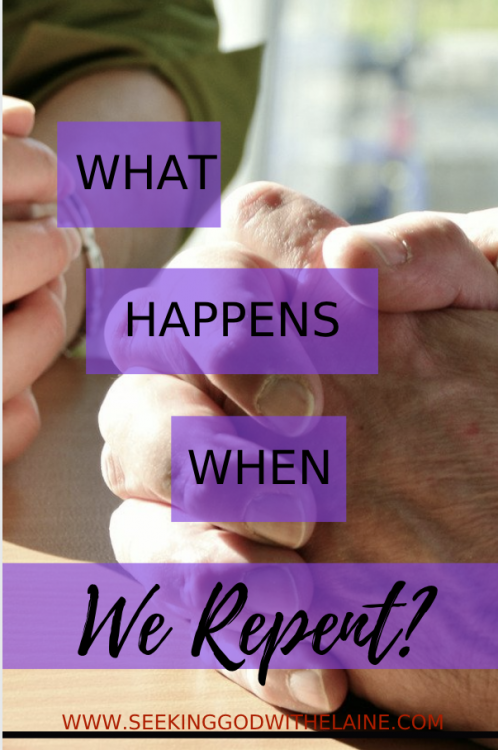The Israelites were worshiping God, but God was not accepting their worship. God wanted to restore them to a right relationship with Him. This daily devotional looks how God wants us to repent and turn to Him.
Nuggets
- God is quick to point out steps in which we can correct our sins.
- The purpose of repentance is restoration.
- The fact that we can reason with God might be a difficult concept for some of us.
- In order to restore our relationship, we have to obey God.
Isaiah’s Message from Sovereign God Series

We know that we are supposed to repent of our sins. Sin is actions by humans that disobey God and break one of His reasonable, holy, and righteous laws and commandments, goes against a purpose He has for us, or follows Satan’s promptings. Repentance is expressing sorrow for breaking God’s laws and commandments by making the commitment to changing ourselves through obedience so that we no longer do the wrong things.
Glossary
But what does all of that entail? Isaiah gives us a good roadmap on what happens when we repent.
Called to Repentance Means Rooting Out Evil
“Wash yourselves. Cleanse yourselves. Remove your evil deeds from my sight. Stop doing evil. Learn to do what is good. Pursue justice. Correct the oppressor. Defend the rights of the fatherless. Plead the widow’s cause” (Isa. 1: 16-17 CSB)
God is quick to point out steps in which we can correct our sins. It isn’t because He wants to point out all of our screw ups. He wants us to deal with them so He can forgive us.
Why is that so important? Whichcote reminds us “that sin is in itself a thing of defilement and pollution.” Our relationships with God are damaged when sins are present in our lives.
Resource
That is why God designed the plan of salvation. He wants us restored to Him.
Oh, yes. It is difficult to break the habits of sinning: “Can an Ethiopian change his skin or a leopard its spots? Neither can you do good who are accustomed to doing evil” (Jer. 13: 23 NIV).
It is difficult, but not impossible. The Homilist wrote, “Sin is no more a part of human nature than a stain is of a garment.” Sin was not part of human nature before the original sin.
Resource
God calls us to fix what is wrong. In fixing it, we are to change our character to be more like His.
If we are to imitate God and exhibit His character, we cannot do this when is in our lives. Sin stops us from doing good, which is detrimental to society.
Secker brought up an excellent point about the order of the words. He contended that the ordered showed us “… that the foundation of acting right is avoiding everything wrong.” He cited Psalm 34: 14; Psalm 37: 27; Amos 5: 15; Romans 12: 9; I Peter 3: 11 as support for this belief. He also noted that Matthew 21: 32; Mark 1: 15; Acts 20: 21; Titus 2: 12-13 also support this by putting repentance before faith and obedience.
Resource
If we are going to act right, the first thing we need to do is remove obstacles on the Sanctification Road. Secker reminded us that “… sin and duty are so essentially opposite, that their interests can never be reconciled.” We start there to shore up the foundation.
Once we have that righted, we move on to how we treat others. Oh, yeah. All of us can hurt others. It generally doesn’t take all that much effort.
But remember that God wants us to be transformed (Rom. 12: 2). Avoidance of sin can be seen as reformation. That is what we do on the Sanctification Road.
Since the Sanctification Road is a process, that isn’t going to happen overnight — and it isn’t going to be easy. Fuller reminded us that “sin is to be overcome, not so much by maintaining a direct opposition to it, as by cultivating opposite principles.”
Resource
We overcome sin by changing our moral culture — our ethics. We change our character to be more like God’s.
When we repent, God expects us to turn from our sinful ways. Saying, “Sorry, God” is no good if we don’t change our character. That is going to take work. We can’t just sit back and expect our character to be changed.
The wonderful thing is that, as soon as we ask for forgiveness, God will forgive us. But it is immediately followed up with His directive to make ourselves clean.
Oh, yes. God can ask us to repent. It is reasonable for God to demand we not only be contrite for sinning, but that we also cease and desist.

Called to Repentance Means Turning Around
“‘Come, let’s settle this,’ says the Lord. ‘Though your sins are scarlet, they will be as white as snow; though they are crimson red, they will be like wool” (Isa. 1: 18 CSB)
The purpose of repentance is restoration. It doesn’t mean we can keep on sinning.
It doesn’t matter what sins we have committed.
- Not the quantity
- Not the quality
We could be a liar. We could be a murderer. God will forgive us — if we ask and submit to Him.
We could commit one sin a week. We could commit one hundred sins an hour. God will forgive us — if we ask and submit to Him.
There is only one sin that God will not forgive. I believe that is unbelief. He will not forgive us for not ABCDing.
Glossary
Robinson explained why Isaiah talked about both scarlet and crimson. One is talking about outward appearance. The other is talking about inward effect.
Resource
I really got a kick out of the “come, let’s settle this.” I can see the love coming through.
It is God’s invitation. We are the ones who disobeyed Him, but He is the one inviting us back into the fold.
God is the Master. We are the servants. Still, He is inviting us back, not ordering us.
We said that we weren’t going to do as He asked. He is the one who gave us a second chance. And third. And fourth. And bazillionth.
The plan of salvation is all God’s doing. God figured it out even before we had sinned — even before He created us.
Called to Repentance Means Reasoning with God
The fact that we can reason with God might be a difficult concept for some of us. I don’t think it should be.
Part of the reason it is difficult is because, as Perkins pointed out, there are two erroneous assumptions that play into it.
We see God as more of a dictator, giving orders rather than talking it through. We think He never explains His actions because He is Sovereign Lord.
Then again, because we see God as Sovereign Lord, we don’t see Him as wanting to mess with our measly problems. We don’t want to foist ourselves on Him.
Perkins gives us a line of thought as to why God does reason with us.
- God sees our whole life, not just our past and current experiences.
- God rocks this Fatherhood gig.
- God knows the results of sin.
Resource
Isn’t it great that we can talk things through with Someone as moral, holy, and wise as God? We don’t have to rely on just our own perceptions. We can go to the One Who is in charge.
We also have to remember that we are made in God’s image. He made us with an intellect and a free will. Free will is the ability within us to make decisions, which determine actions that produce character.
God wants us to make a conscious decision to follow Him. He knows that means we will have to reason it out so that we can fully submit to Him.
Why are we reasoning with God? Finney said that “we are to present reasons which will sanction the exercise of mercy.”
Resource
We do have to watch out here. We are reasoning with God, not arguing with Him. We are not trying to justify our actions or opinions.
We are here to confess and transform. That means renounce and turn away from sin.
Is this so hard to understand? God wants to have a relationship with us. We don’t have relationships if we don’t communicate. Dictating is not communicating.
We have to never forget that, yes, these were — and we are — God’s people. Yes, we can — and will — continue to sin.
Even though God is a God of love, they continued to sin. That doesn’t mean there is something wrong with God. That means there is something wrong with mankind.
What is worse is the Israelites thought they were religious. We talked in the last devotion about the fact that the Israelites held tightly to the ceremony of the temple even while they were worshiping idols and sacrificing their kids to other gods.
But God is a God of love. Look what He told them to do. He accepted them back — then told them to clean up their act. Bottom line — if they repented — He would restore them.
Oh, yes. Sin has consequences. But God provides a cure.

The True Way of Deliverance
“If you are willing and obedient, you will eat the good things of the land. But if you refuse and rebel, you will be devoured by the sword.’ For the mouth of the Lord has spoken” (Isa. 1: 19-20 CSB)
God wants us to repent. God wants our relationships with Him to be restored. In order to restore our relationship, we have to obey Him.
“If you are willing and obedient …” Even after we become disciples of Christ, we still have our free will. Free will is the ability within us to make decisions, which determine actions that produce character.
Henry pointed out a nuance of what Isaiah said. God isn’t calling on us to be 100% perfect in following His laws and commandments. Rather, God wants us to be willing to try (Henry’s Sincere Obedience Accepted).
There will be judgment for those who do not ABCD. There will be repercussions for those who are not obedient.
We know this because we have been told in the Scriptures. Spurgeon wrote, “All Scripture, being inspired of the Spirit, is spoken by the mouth of God.” If Scriptures said it will happen, it will happen.
Resource
Isaiah was willing to speak of it, too. He didn’t hesitate. He told it like he was told.

Making the Connections
If God has spoken it, we can take it to the bank. As Spurgeon wrote, “‘The mouth of the Lord hath spoken it,’ is the foundation of our confidence. There is forgiveness; for God has said it.”
Resource
All of the — the forgiveness, the actual plan of salvation itself, the reasoning — all stems from God loving us. God wants that relationship with us. He will do His part to make it happen.
Look what Perkins had to say. He wrote, “Right in between the eternal and infinite righteousness and the sinner’s doom mercy breaks in, pardon perfect and complete.” God’s goal is to forgive us.
Resource
How Do We Apply This?
We have to do our part. We have to ABCD.
The ABCDs of Salvation
If you have not become a believer in Christ, please read through the
Plan of Salvation and prayerfully consider what God is asking you to do.
A – admit our sins
B – believe His Son Jesus is our Redeemer
C – confess God as Sovereign Lord
D – demonstrate that commitment by making any changes needed in our lives to
live the way in which God has called us
The Disciple’s Job Description
God won’t force us to come to Him. He comes to us with the invitation.
Once we come and receive the forgiveness, there are requirements. Melvill reminded us that the Jews were told to make themselves clean. They were told to stop sinning and start obeying. It was their decision – just as it is ours.
Stop sinning. Start portraying God’s character. We can do it.
Father. You are so gracious to us. You extend the invitation to restore us to a relationship with You. It isn’t based on anything we do. It is based on Your love for us. You say that it is within us to turn from our sinful ways. Lord, there are times that we just don’t see that. Help us to grow our characters to be like You. Amen.
What do you think?
Leave me a comment below (about this or anything else) or head over to my Facebook group for some interactive discussion.
If you don’t understand something and would like further clarification, please contact me.
If you have not signed up for the email daily or weekly providing the link to the devotions and the newsletter, do so below.
If God has used this devotion to speak with you, consider sharing it on social media.
Pingback: Isaiah’s Message to Ahaz – Seeking God with Elaine
Pingback: Isaiah’s Message about the Baby – Seeking God with Elaine
Pingback: Isaiah’s Message of Salvation – Seeking God with Elaine
Pingback: Isaiah’s Message on God’s Provision – Seeking God with Elaine
Pingback: Isaiah’s Message on God’s Deliverance – Seeking God with Elaine
Pingback: Isaiah’s Message on Living for God – Seeking God with Elaine
Pingback: Isaiah’s Message of Service – Seeking God with Elaine
Pingback: Isaiah’s Message on God’s Purpose – Seeking God with Elaine
Pingback: Isaiah’s Message on Renewal – Seeking God with Elaine
Pingback: Isaiah’s Message on Our Call from God – Seeking God with Elaine
Pingback: How Does God Call His Messengers? – Seeking God with Elaine
Pingback: How Are God’s Messengers Supposed to Respond? – Seeking God with Elaine